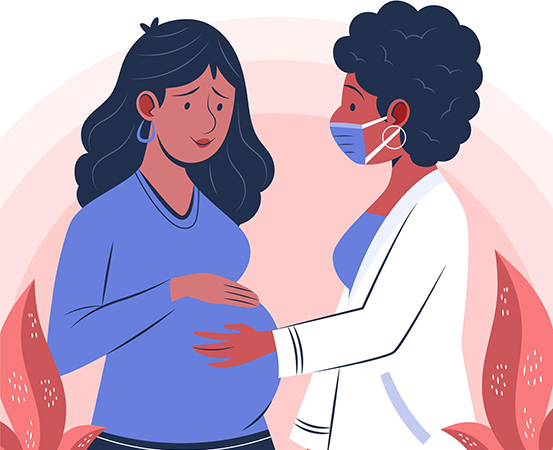
Pregnancy is a sequencing act, right from fertilisation to delivery, but sometimes when this pattern is disrupted, it can result in an ectopic pregnancy. Normally the fertilised egg attaches to the lining of the uterus but an ectopic occurs when the egg implants and grows outside the main cavity of the uterus.
Take the case of Namita N, 36, a communications professional based in Delhi. She first conceived in the year 2019, at age 32, when she had been married for just one and a half years. “We wanted to have a baby early. So when I finally got pregnant, my husband and I were over the moon,” says Namita whose joy was, however, short-lived.
“The pregnancy proceeded like any other, but when I went for the baby’s heartbeat scan, at around six weeks, I was told that it was an ectopic pregnancy and that there was no way the baby could survive. It was also a health risk for me, and I would have to terminate it. It was beyond traumatising to hear this,” she recalls.
Her doctors wasted no time in performing a laparoscopic surgery and the pregnancy was terminated before it could turn risky for her. “An ectopic pregnancy is what nobody wishes for. After this, I was riddled with questions about whether I’d be able to come out of the traumatic incident of losing a baby that I wanted so badly, whether I would ever be able to conceive again and whether my scars would ever heal.”
To add to her woes, post the laparoscopy, which was somewhat botched up, she had a hematoma for almost seven months and could not conceive. “It was a very tough time,” she recalls.
But all’s well that ends well. Today, three years later, she is the mother to a bonny, healthy one-year-old.
In a nutshell, an ectopic pregnancy can make the best-laid plans go haywire. We ask an expert to explain.
According to Dr Nupur Gupta, director, obstetrics and gynaecology, Fortis Memorial Research Institute, Gurgaon, “This [ectopic pregnancy] happens when the fertilised egg does not attach itself to the uterine lining; instead, it may attach itself to the fallopian tube, the ovary, abdominal cavity or even the cervix. The fertilised egg can be anywhere. This can be a medical emergency. Mostly, ectopic pregnancies happen in the fallopian tube. Tubal pregnancies like these are quite common and unlike others, cannot proceed normally. It can go undetected and untreated if there are no overt symptoms, as it is like any other pregnancy on the surface.”
Symptoms and treatment
Dr Gupta of Fortis says that like most pregnancies, ectopic ones also have the same symptoms as nausea, breast pain, increased urination, fatigue etc. But the warning signs to watch out for can be:
- Light vaginal bleeding
- Sharp pain in the pelvis or abdomen
- Fainting
- Shoulder pain
- Rectal pressure
Ectopic pregnancies are quite common and in 90 per cent of cases, the egg attaches itself to a fallopian tube; this is called a tubal pregnancy. When the fertilised egg grows, it can rupture and can cause life-threatening bleeding. For this, one needs immediate medical care and treatment, or else it can be fatal. Ectopic pregnancies are the leading cause of pregnancy-related deaths in the first trimester.
If the ectopic pregnancy is detected early, it is treated with an injected medication called methotrexate to stop cell growth and dissolve existing cells. There could be one more HCG test to check if the treatment is working and if one needs more medication.
In the later stages of an ectopic pregnancy, a laparoscopic surgery can be done to terminate the pregnancy.
There is no way that an ectopic pregnancy can survive, unless as in some rare cases where a lot of medical procedures and different kinds of treatments have been used, as reported by the Guardian in 1999 about a mother and her triplets that were all saved. The delivery was conducted at 26 weeks, at the King’s College hospital, London.
The fertilised egg in an ectopic pregnancy is not ‘viable,’ meaning that it is impossible for the egg to survive and grow into a baby that can survive in or outside the body. There will be a pregnancy loss as the egg can’t get the blood supply and support it needs to grow outside of the uterus.
Experts say while there is no way to prevent an ectopic pregnancy, the risks can be lessened by trying to reduce the risk of pelvic inflammatory disease by limiting the number of sexual partners and using a condom during sex to prevent STDs and stopping smoking, before trying to get pregnant.

















